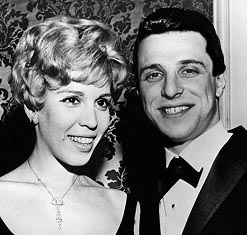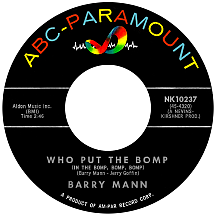BARRY MANN
Who Put the Bomp (In the Bomp, Bomp, Bomp)
The goal was set: write songs, make records, become famous. These things were all within Barry Mann's reach...less than 20 miles from home! As soon as high school ended in 1956, he left his Brooklyn stomping grounds for Manhattan, making a northern-loop detour to the Catskills to earn some much-needed money working as a busboy at Zalkins Birchwood Lounge (probably the last "real" job he ever had). Songwriter and pianist Jack Keller was playing with the house band that summer and passed on a few contacts to the young upstart...after which it would be Barry's responsibility to grab the attention of those N.Y. music publishers. About a year after arriving, he made his first record as a singer; within another year the still-barely-teenaged go-getter had his first hit as a pop composer while continuing to make records in pursuit of stardom.
By the time autumn '61 rolled around, he'd scored a top ten hit as a vocalist with a song specifically about the effect songwriting legendarily has on romance. And what a crazy song it is: "Who Put the Bomp (In the Bomp, Bomp, Bomp)," a parody of sorts, used hooks from (or similar to) doo wop and teen hits of the day: 'rama-lama-ding-dong' and 'bop-shoo-bop-shoo-bop' and 'dip-da-dip..da DIP' and 'boogity-boogity-SHOO' in a tribute to the guys (and gals) who penned such nonsensical lyrics for fun and profit (the song is a variation on Brooklyn duo Bob and Jerry's "We're the Guys (Who Drive Your Baby Wild)" from the previous year). It's not a stretch to imagine someone saying, "Hey, Barry...that isn't exactly a serious song ya got there! But...the production is good...the vocals are good...it sounds like a hit!'" And it was a hit. At that point there would be no turning back; Barry Mann became a mainstay of the music business for, oh, seven decades or so. And he did it with a lifelong partner...a perfect match who's made the journey with him!
He'd landed in the middle of the action in 1957, right near Times Square at the Brill Building, working for a smaller company and then the following year for Aldon Publishing, the infamous cubicled "assembly line" filled with some of the hottest tunesmiths ever. His first attempt as a singer was the summer '58 single "They Could Be Wrong" using the alias Buddy Brooks (his birth name, Barry Imberman, just didn't have the right ring to it...but it would have if he'd just shortened it a little). The record flopped, but only a few more months passed until his first brush with success; with fellow Aldon writer Mike Anthony, he penned "She Say (Oom Dooby Doom)," transformed by Toronto quartet The Diamonds into a great pop/doo wop number that reached the national top 20. A minor hit, "Don't Destroy Me" by Crash Craddock (cowritten with Joe Shapiro) followed, as did Steve Lawrence's 1960 top ten "Footsteps" (Hank Hunter his collaborator) and two that year written with one of the more successful Brill composers, Howard Greenfield: "The Way of a Clown" by Teddy Randazzo and "Counting Teardrops," a major hit for Emile Ford and the Checkmates in an altogether different music sector, Great Britain.
Cynthia Weil, not quite 20 at the time, came into Barry's life and made an immediate impact. She was what you might call a bit more upscale, having grown up on Manhattan's Upper West Side with a childhood spent studying piano and taking ballet lessons; majoring in theater, she'd already graduated from Sarah Lawrence College in Yonkers. Cyn had been working on song lyrics, which intrigued Barry. He'd just signed a performing contract with ABC-Paramount using the logical abbreviated stage name Barry Mann. Kickoff disc "War Paint," penned with regular (for the time being) collaborator Greenfield, failed domestically but scored overseas in spring '61 for British duo The Brook Brothers. Barry's own follow-up, "Happy Birthday, Broken Heart," employed several teen-angst gimmicks in a slick production but missed the mark. No need for concern; by summertime, his career...and private life...started clicking.
'I'd like to thank the guy...who wrote the song...that made my baby fall in love with me!' leads off the tune that amusingly massaged Barry's peers, raising his profile several notches while riskily positioning him as something less than a "serious" artist. But the irresistible energy of "Who Put the Bomp" (composed with Gerry Goffin) carried it to the top ten in September '61. Backing vocals by Bronx-based quartet The Halos, who'd already skillfully enhanced Curtis Lee's top ten smash "Pretty Little Angel Eyes" and Gene Pitney's "Every Breath I Take" (both Phil Spector productions) and were climbing the charts with their own top 30 hit, "Nag," helped boost Barry's breakthrough with their infectious sound. Meanwhile, Cynthia and Barry had begun their songwriting union and taken it a step further to the sound of August wedding bells, just before "Bomp" hit the top ten and "Bless You," recorded by 17-year-old singer Tony Orlando, became the cozy couple's first joint songwriting success with a top 20 ranking.

The U.K. was developing into a lucrative market for Mann's music; a nearly-identical cover of "Bomp" by vocal trio The Viscounts (a different group than the American instrumental band of the same name) was a hit there in the fall; shortly afterwards, Billy Fury made a high-chart showing with the Mann-Goffin song "I'd Never Find Another You." Back home, Spector's production of Mann and Larry Kolber's "I Love How You Love Me" was top ten for The Paris Sisters in October; Barry's solo-penned "Come Back Silly Girl" became a hit for The Lettermen in early '62. Yet his post-hit recordings struggled like the initial pair had; "Little Miss U.S.A.," the first Mann-Weil composition on a Barry Mann 45, dealt with a similar teenage theme but couldn't crack the Hot 100.
The newlywed husband-and-wife team, at the outset their unbelievable string of jointly-penned hits, accelerated. "If a Woman Answers" by Leroy Van Dyke, "Uptown" by The Crystals, "Conscience" by James Darren and "Johnny Loves Me" by Shelley Fabares were all popular in 1962. Mann continued, without luck, to make teen-centric records for ABC-Paramount and Colpix, then scored with just such a song he and Larry Kolber had written; "Patches" was a breakthrough for Memphis-born warbler Dickey Lee. Highlights for Mann and Weil in '63 include "My Dad" (Paul Petersen), "Proud" (Johnny Crawford), "Blame it on the Bossa Nova" (Eydie Gorme) and the Crystals' "He's Sure the Boy I Love." The Drifters' hit "On Broadway," a collab with Jerry Leiber and Mike Stoller, was somewhat autobiographical (describing the stuggle of making it as a songwriter in New York's competitive atmosphere) and gained the approval of fans and critics. "Only in America" by Jay and the Americans contained a social message about achieving any dream a person may have, as the duo's content was becoming more sophisticated...leading to an eventual berth among the 20th century's most accomplished songwriting teams alongside Goffin and Carole King, Bacharach-David, Lennon-McCartney and others.
"Talk to Me Baby," a Mann-Weil composition Barry recorded for the Red Bird label, briefly charted in December '64, its production far removed from the "Bomp, Bomp, Bomp" of three years earlier. While Barry continued making records, songwriting became Mann and Weil's stock-in-trade (they wrote together almost exclusively after 1962). The hits kept coming: "I'm Gonna Be Strong" by Pitney, "Walking in the Rain" by The Ronettes, "Saturday Night at the Movies" by the Drifters and, as 1965 began, their most accomplished hit of all (with Spector's input), "You've Lost That Lovin' Feelin'" by The Righteous Brothers, a number one single (also a major hit in the U.K. for Cilla Black). Throughout the years, this composition has proved its timelessness.
The duo continued to impress, supplying hit songs for The Animals ("We Gotta Get Out of This Place"), The Vogues ("Magic Town"), Paul Revere and the Raiders ("Kicks," "Hungry") and another number one for the Righteous Brothers ("(You're My) "Soul and Inspiration"). Barry's next recordings (all Mann-Weil tunes released by Capitol records) include "Angelica" (a big orchestral ballad) in '66, "The Young Electric Psychedelic Hippie Flippy Folk and Funky Philosophic Turned On Groovy 12 String Band" in '68 and 1969's "I Just Can't Help Believin'," which became a major hit for B.J. Thomas the following year. Several early successes were hits a second time: Bobby Vinton's remake of "I Love How You Love Me," Jay and the Americans' "Walkin' in the Rain" and Dionne Warwick's take on "You've Lost That Lovin' Feelin'," not the last version to land in the upper reaches of sales and airplay lists throughout the coming years.
The songs of Mann and Weil were a big part of any radio listeners' life from the 1960s through the '80s or even beyond. Their career had also transitioned into creating music for films and Broadway shows and a number of high-profile awards came as a bonus. It took awhile before they got on Grammy's radar; the moment came in March 1988 when, with James Horner, they won Song of the Year for "Somewhere Out There," a hit for Linda Ronstadt and James Ingram from the animated film An American Tail (it was also nominated for an Oscar in the category Best Original Song). An unrivaled distinction came from BMI (Broadcast Music, Inc.); in 1999, "You've Lost That Lovin' Feelin'" was named the number one most-played song on radio and TV (with more than eight million spins) during the entire 20th century (well, since the early 1920s, anyway).
As for Barry Mann's one big hit as a singer, "Who Put the Bomp (In the Bomp, Bomp, Bomp)" was destined not to be forgotten. In 1970, obsessed rock and roll writer Greg Shaw launched a contemporary music fanzine titled Who Put the Bomp and started Bomp! Records a few years later, each endeavor paying tribute to but not necessarily focusing on the music of the specific 1960s era. Later, the song was unexpectedly revived by British band Showaddywaddy (with a slight retitle, "Who Put the Bomp (In the Bomp-A-Bomp-A-Bomp)") and made it into the U.K. top 40 in the fall of 1982.


